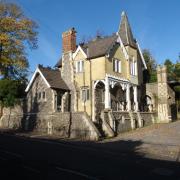Lyme disease can strike anyone, says Angela Knight. As a former sufferer, she should know. The New Forest has been identified as a hotspot, but that shouldn’t deter anyone from visiting, as long as they’re ‘tick aware’
Summer brings everyone into the beautiful Hampshire countryside, including tiny ticks the size of poppy seeds. People and pets risk being bitten and made very ill if this tiny spider-like parasite attaches itself to you. It’s often not detected because it injects a chemical which numbs the bite area. Ticks can transmit bacteria that cause Lyme Disease. The first symptom is usually a ‘summer’ flu, sometimes a circular rash, fatigue and muscle and joint pain. Other conditions such as meningitis, facial palsy, nerve damage and arthritis can develop without treatment.
Twenty years ago I found a ‘bull’s-eye’ rash on my arm. I asked my doctor for a Lyme test but was told that ‘you don’t get Lyme Disease in this country’. I was later asked if I had recently been to the New Forest. As I hadn’t I was told to go home and see if the circles got bigger. But it is vital to get an early diagnosis. If diagnosed late it is very difficult to cure and sufferers can go from one specialist to another trying to find the cause of numerous symptoms.
My test was negative, but I did not realise that a second test was conducted, so weeks later my Doctor rang to say, “You have Lyme disease, whatever that is, but it has probably gone by now.” I felt extremely ill.
For 25 years the NHS has used a two-step antibody test for Lyme Borreliosis. However, in the first few weeks of infection antibodies won’t be produced so people can test negative but still have the disease. I found that I needed antibiotics to kill the bacteria invading my body and thankfully my doctor prescribed them.
Present Lyme guidelines say that two weeks of antibiotics should get rid of it, but by the time it is detected it usually requires longer treatment, sometimes intravenously. The National Institute for Clinical Excellence (NICE) is revising guidelines for diagnosis and treatment and they will be available next year.
I had a month of antibiotics but still had ‘brain fog’ and migrating arthritis to mention a few symptoms. Another test was negative, but after having antibiotics an antibody test will always be negative. I have had two new hips because of Lyme-arthritis and have had shingles five times. Last year I sent my blood to a German lab for testing and the results were positive: ‘Active Lyme Borreliosis’. This time, I turned to herbal treatments and now feel well.
Fiona Guinness (76), a Zoologist from Biddesden near Andover, has researched Red Deer annually on the Isle of Rum, Scotland, since 1969. Deer are common hosts to ticks and she was bitten numerous times, but in May 1982 she contracted Lyme disease and has been suffering ever since. She developed an itchy rash on her back, writers’ cramp, stiff joints and extreme tiredness. Doctors didn’t know what was wrong as her NHS Lyme test was negative. Symptoms included tingling and numbness, neuropathy, stabbing pains that rapidly move around the body, painful soles of feet, joint pain, headache and neck pain, muscle and tendon pain.
Fortunately, the hospital in Fort William diagnosed Lyme and gave her two weeks of intravenous antibiotics. This stopped her symptoms getting worse but because Lyme affects the immune system Fiona had developed allergies. She was recommended the private Breakspear Hospital in Hemel Hempstead, Hertfordshire. It uses numerous tests for Lyme and with the help of vaccines for allergies, supplements and other treatments Fiona’s symptoms have improved.
She caught Lyme twice more in one month where she lives and rushed to her surgery for a month’s dose of antibiotics. Only a nurse was available who told her: ‘Wait till we see how it goes’ and she had Lyme for several more years.
Fiona says: “I believe the incidence of Lyme is higher in Hampshire than on Rum. Although there are millions of ticks on Rum it is not often that people catch Lyme there. Locally, even a few bites can be dangerous. People mustn’t take no for an answer. If you have a tick bite see a doctor and insist on antibiotics. I wouldn’t be alive if it wasn’t for the Breakspear Hospital.”
Kellie Maher (28) lives near Ringwood and has been sick for 12 years. On bad days, she was bedbound in a dark room, unable to tolerate light or sound and in constant pain. Symptoms included severe fatigue, joint and muscle pain, Bell’s Palsy (paralysis on one side of her face), neuropathy (nerve pain) and fainting. She tested negative for Lyme disease on the NHS, but years later paid for a more sensitive Lyme test through a German laboratory; the results were positive for Lyme disease and co-infections.
Her parents paid for private treatment abroad and she saw improvements, attending university as a disabled student with a mobility scooter, but had to leave three years into a four-year course, due to another decline. Her parents have since paid for stem cell treatment in Germany and she has seen improvements. Kellie and her friends have now set up a charity, About Time for Lyme, to raise awareness.
An all-party Parliamentary Lyme disease group has been set up and Sir Desmond Swayne, MP for New Forest West, is a supporter, as his wife Moira has Lyme Disease. He says: “As MP for the New Forest I have had dealings with an increasing number of constituents suffering the effects of Lyme Disease, including my wife. The potentially devastating impact on patients, and the increasing number of them, demand more effective diagnosis and treatment.”
Public Health England say there were 1,136 blood tests in 2016. In Germany 250,000 cases are recorded annually and in the U.S. 300,000. The incidence in England and Wales is estimated at between 15,000 and 30,000 cases. A spokesman says: “It is rare to catch Lyme disease from a tick bite. We do however want everyone to be tick aware. Walk on paths, check for bites, remove ticks using tweezers as soon as possible and contact your GP if you develop a spreading rash or feel unwell.”
The New Forest is a Lyme hot spot, although they are found in gardens, parks, paths and towns. If you find one use a tick remover and visit your doctor. Not everyone develops a rash or sees the tick that bit them, so record any symptoms and reassure yourself that, if treated early, Lyme can be cured.
More…
• Sarah Parish and James Murray’s campaign for a children’s A&E unit in Southampton - They’re famous, successful and happily married to each other. What more could actors Sarah Parish and James Murray want? Try a £4m children’s A&E unit in Southampton. Faith Eckersall hears about the motivation behind their mission



























